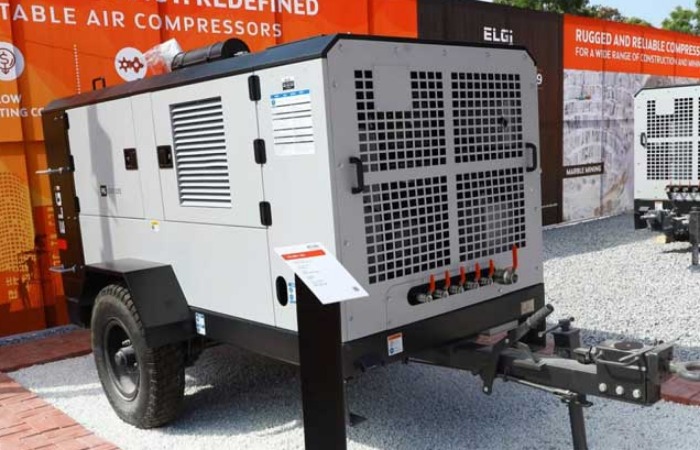
Breathing Life into Projects
This growth in the infrastructure sector is anticipated to boost the need for portable air compressors, presenting an attractive opportunity for air compressor brands such as ELGi to be part of the growth story. Electric and diesel-powered screw air compressors have become indispensable tools in the construction and infrastructure industry, providing a reliable compressed air source for various applications. Electric screw air compressors are the preferred choice of project managers for construction sites that have a reliable electrical supply. Electric portable air compressors offer benefits such as higher energy efficiency, lesser operational expenses, and lower environmental footprint. Additionally, electric compressors produce less noise, making them ideal for noise-sensitive construction sites. Their compact and portable design enables easy transportation and maneuverability at construction sites. Simultaneously, their ability to power various pneumatic makes them essential for construction tasks that require compressed air.
At construction locations where a consistent electrical power source might be missing, or mobility is essential, diesel-driven screw air compressors come into play. These compressors are typically mounted on trailers or skids, facilitating effortless transportation between construction sites. Designed to endure harsh dusty settings and rigorous construction tasks, diesel air compressors perform exceptionally well in challenging environments at infrastructure project sites. They provide enhanced versatility by functioning in remote or off-grid areas with no electrical power supply. Diesel compressors often provide higher airflow and pressure capabilities, making them suitable for challenging construction tasks that require substantial compressed air output.
Here are some critical uses of air compressors in the infrastructure sector:
Pneumatic tools: Air compressors power many pneumatic tools used in construction and maintenance work. These tools include pneumatic hammers, drills, wrenches, nail guns, and sanders.
Concrete and cement production: In construction, air compressors operate equipment such as concrete pumps, cement mixers, and pneumatic vibrators. Compressed air helps convey and spray concrete, making construction more efficient.
Pavement maintenance: Air compressors are used for tasks like crack sealing, pavement marking, and road surface repair. Pneumatic equipment is commonly employed for these applications.
Road construction and repair: In road construction, air compressors are used to power equipment such as pneumatic rollers, which are used to compact and smooth the road surface.
Bridge construction: Air compressors are used for drilling, piling, cutting, and maintenance work. They power tools like pneumatic bridge deck vibrators, concrete vibrators, and riveting machines.
Tunnelling and mining: In infrastructure projects that involve tunnels and mining, air compressors are used to operate rock drills, tunnel boring machines, shotcrete machines for concreating tunnel surfaces, and other pneumatic equipment.
Cleaning and maintenance: Air compressors are employed for cleaning and maintaining infrastructure, such as removing dust and debris from construction sites, equipment, and structures.
Bridge and dam maintenance: Air compressors are used to maintain and repair infrastructure such as bridges and dams. They power tools for inspection, repair, and corrosion control.
Pipeline construction: In the construction of pipelines, air compressors are essential for tasks like trenchless drilling and pipe laying, de-watering, pigging, and sandblasting. They also power pneumatic drilling rigs and other equipment.
Air compressors are engineered for various capacity requirements and end-use, including stationary and portable models. The choice of compressor depends on the specific requirements of the infrastructure project. They are versatile tools that enhance efficiency, safety, and productivity in constructing and maintaining infrastructure.
The future of air compressors in India will likely be characterized by a shift towards energy efficiency, sustainability, and advanced digital technologies. This evolution will be driven by the growing need for compressed air in various sectors and the desire to reduce energy consumption and environmental impact. The Indian air compressor market is expected to adapt to these trends and offer innovative solutions to meet the changing demands of industries across the country.
Footnote:
The article is authored by Ramesh Kumar G, Vice President, Portables at Elgi Equipments.


 +91-22-24193000
+91-22-24193000 Subscriber@ASAPPinfoGlobal.com
Subscriber@ASAPPinfoGlobal.com